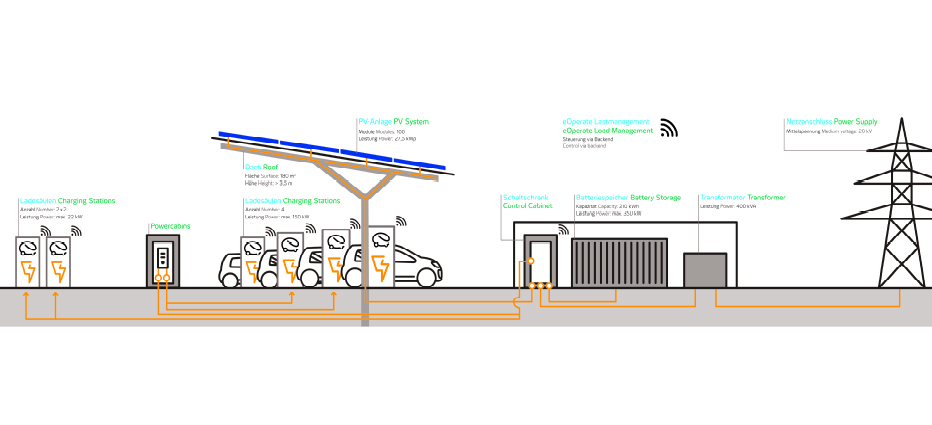
innogy has now officially commissioned its new fast-charging facility in the presence of NRW Premier Armin Laschet and Lord Mayor of Duisburg, Sören Link.
The location near the motorway junction in the immediate vicinity of the A42 and A59 is ideal for transit traffic and also makes it easier for city dwellers with no dedicated car park to choose electric mobility. In large cities in particular, car drivers frequently have no way of charging their vehicles at home. But buying zero-emission, fume-free electric vehicles makes particular sense in large built-up areas as a means of sustainably improving urban air quality.
Armin Laschet, NRW Premier, said at the official opening: “North Rhine-Westphalia wants to be the pioneer, driver and impetus-giver for electric mobility in Germany. To achieve this, we need to ensure that the production and expertise for key components of electric mobility are located in our federal state. The new joint charging park of innogy SE and the municipal utility of Duisburg is therefore a particularly exciting project. Its highly sophisticated fast-charging stations and its good connection to motorways and the inner city are important factors in making electric mobility successful in the metropolitan region of the Ruhr and in North Rhine-Westphalia. This project demonstrates the high level of innovative energy in the Ruhr region.”
This innovative joint project of the new innogy subsidiary eMobility Solutions GmbH and local municipal utility Stadtwerke Duisburg combines fast-charging stations and a solar roof with a battery component. After all, local grid capacity is often insufficient to support large-scale expansion of fast-charging stations. In Duisburg, the integrated battery storage feature significantly minimises pressure on the grid. It buffers peak load periods, when several vehicles are fast charging on full power at the same time. Battery storage also maximises the full capacity of local solar power, which means this forward-looking electric fuel station can at times operate completely off-grid.
As Hildegard Müller, Chief Operating Officer Grid and Infrastructure for innogy SE, said: “innogy supports the process of energy transition and is committed to continual development of electric mobility. The aim of this project is to bring more renewables to the road. Green power can be drawn down locally from the roof or the battery storage facility. If both are insufficient as a result of a lengthy overcast period, supplementary green power can be sourced from the grid. It will not take long for the energy management system to learn from customer demand patterns and weather statistics how to optimise the load of the battery so people can charge their vehicles quickly without putting pressure on the grid.”
Sören Link, Lord Mayor of Duisburg: “Particularly in view of climate change and inner-city air quality, electric mobility is becoming an increasingly important option. This forward-looking fast-charging facility of innogy and Stadtwerke Duisburg makes a significant improvement to the charging infrastructure of our city and will further increase the appeal of local, fume-free driving.”
The company is breaking new ground with this charging station in more ways than one. As Elke Temme, managing director of innogy eMobility Solutions GmbH, says: “With this ground-breaking project, we have chosen to install tomorrow’s infrastructure today. Ultra-fast charging stations, great convenience for our customers with our IT system in the background as the basis for low-cost grid expansion – that is the formula for a completely new charging experience and for the EV fuel station of the future.”
Driven by an intelligent energy management system, the project comprises four DC fast-charging stations with 150 kW of capacity each and a battery storage component with 210 kWh of capacity. The 180-sq-m solar roof can supply 26,000 kWh green power per year or around 200,000 kilometres of emission-free driving. The fast-charging stations were supplied by Porsche and Delta and the battery storage unit comes from Belectric.
Marcus Wittig, General Manager of municipal utility Stadtwerke Duisburg AG: “The quick-charging park is the next logical step in developing our inner-city charging infrastructure in Duisburg. Shorter charging times are a crucial factor in helping electric mobility to break through. Therefore, the charging park is a good example of the further development of this drive technology.”
This charging station in the centre of the Ruhr region is the flagship of innogy’s R&D activities in the field of electric mobility. The integrated energy management system continually relays the available capacity from the grid and the battery to the computer centre behind the charging stations. In future, the computer centre will be able to keep the battery at the optimal load, based on typical consumption patterns and current weather forecasts (predicted sunshine hours for the following day).
The trial operation period began a few weeks ago. Further practical insights will now be derived from real-time operation. Having scientists monitor the pilot project will also give the operators the key insights they need to replicate the concept in further locations.
Author: Edyta Szwec